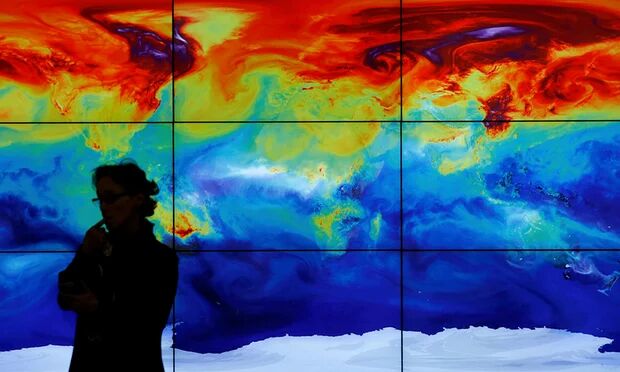导读:巴黎世界气候大会上达成了将全球升温控制在1.5度的目标。然而今年4月份的气温再创新高,二氧化碳的浓度也在不断上升,令人们愈发担心全球变暖对地球带来的影响。

Last month was the hottest April on record globally – and the seventh month in a row to have broken global temperature records.
算上今年4月,全球气温记录已连续七个月遭到改写,同时这也是史上最热的4月份。
The latest figures smashed the previous record for April by the largest margin ever recorded.
最新公布的数据显示,今年4月的气温增幅前所未见,刷新了此前创下的4月份最高气温记录。
It makes three months in a row that the monthly record has been broken by the largest margin ever, and seven months in a row that are at least 1C above the 1951-80 mean for that month. When the string of record-smashing months started in February, scientists began talking about a “climate emergency”.
全球气温已连续七个月比20世纪50年代至70年代同期水平至少高出1摄氏度,并自今年2月始连续三个月打破气温记录。这令科学家谈论起名为“气候紧急状态”的现象。
Figures released by Nasa over the weekend show the global temperature of land and sea was 1.11C warmer in April than the average temperature for April during the period 1951-1980.
上周末美国航空航天局公布的数据显示,今年4月份全球海陆气温要比20世纪50年代至70年代同期平均水平升高1.11摄氏度。
It all but assures that 2016 will be the hottest year on record, and probably by the largest margin ever.
2016年由此将成为史上最热的一年,也非常可能刷新气温增幅的记录。
The new record broke the previous one by 0.24C, which was set in 2010, at 0.87C above the baseline average for April. That record itself broke one set three years earlier at 0.75C above the baseline average for April.
四月份气温增幅记录起初为2007年的0.75摄氏度,三年后该记录提升到了0.87摄氏度,而今年这一数字又上涨了0.24。
The current blast of hot air around the globe is being spurred by a massive El Ni?o, which is a release of warm water across the Pacific Ocean. But it’s not the biggest El Nino on record and that spike in temperatures is occurring over a background of rapid global warming, pushing temperatures to all-time highs.
由于受到大规模厄尔尼诺现象的影响,太平洋海水升温,全球热空气运动加剧。但此次的厄尔尼诺现象并非有史以来最严重的一次,全球变暖现象呈不断加速之势,气温逐渐攀升至最高值。
“The interesting thing is the scale at which we’re breaking records,” said Andy Pitman, director of the ARC Centre of Excellence for Climate System Science at the University of New South Wales in Australia. “It’s clearly all heading in the wrong direction.
“有趣的是我们刷新纪录的规模,”澳大利亚新南威尔士大学ARC气候系统科学研究中心的负责人安迪·皮特曼说“很明显一切正在朝着错误的方向前进。”
“Climate scientists have been warning about this since at least the 1980s. And it’s been bloody obvious since the 2000s. So where’s the surprise?” said Pitman.
“气候学家至少从20世纪80年代便开始发出类似的警告,进入21世纪以来此种现象则变得愈发明显,所以还有什么好惊讶的呢?”
Pitmans said the recent figures put the recent goal agreed in Paris of just 1.5C warming in doubt. “The 1.5C target, it’s wishful thinking. I don’t know if you’d get 1.5C if you stopped emissions today. There’s inertia in the system. It’s putting intense pressure on 2C,” he said.
皮特曼和其他科学家表示,最近公布的数据令人们对能否完成在巴黎达成的将升温控制在1.5摄氏度的目标心存疑虑“1.5度的目标简直是异想天开。如果从今天开始停止气体排放,我都不知道能不能做到这一点。制度存在着惰性,这种惰性令将升温控制在2摄氏度以内的目标都面临着压力。”
The record temperatures were wreaking havoc with ecosystems around the world. They’ve triggered the third recorded global coral bleaching, and in Australia 93% of the reefs have been affected by bleaching along the 2,300km great Barrier Reef. In the northern parts of the reef, it’s expected the majority of coral is dead, and on some reefs over 90% of the coral is dying.
创纪录的高温对世界各地的生态系统造成了极大危害,引发了史上规模第三大的珊瑚白化。澳大利亚长达2300千米的大堡礁中93%的珊瑚都受到了影响,在其北部地区大量珊瑚遭遇灭顶之灾,而有些区域九成的珊瑚都已死亡。
A recent analysis showed the bleaching on the Great Barrier Reef was made 175 times more likely because of climate change, and the conditions that caused it would be average in fewer than 20 years.
最近的一项分析表明,气候变化是大堡礁珊瑚白化的罪魁祸首的可能性是其他因素的175倍,而在未来的近20年内气候变化将成为普遍现象。
The April figures come as the symbolic milestone of CO2 concentrations of 400 parts per million (ppm) have been broken at the important Cape Grim measuring station in Tasmania, Australia.
随着4月气温数据得以揭晓,澳大利亚Tasmania地区重要的Cape Grim测量站的二氧化碳浓度也突破了标志性大关--400ppm。
Reflecting on the CO2 concentrations, Pitman said: “The thing that’s causing that warming, is going up and up and up. So the cool ocean temperatures we will get with a La Ni?a are warmer than we’d ever seen more than a few decades ago … This is a full-scale punching of the reef system on an ongoing basis with some occasionally really nasty kicks and it isn’t going to recover.”
谈及二氧化碳浓度的问题,皮特曼表示:“造成全球变暖的物质的浓度在不断上升。因此厄尔尼娜现象带来的本应较低的海洋温度反而比几十年前更高。这对珊瑚是全方位的破坏,而造成破坏的元凶仍在发展壮大,其中一些破坏令人扼腕,而且大自然找不到修复它的方法。”







